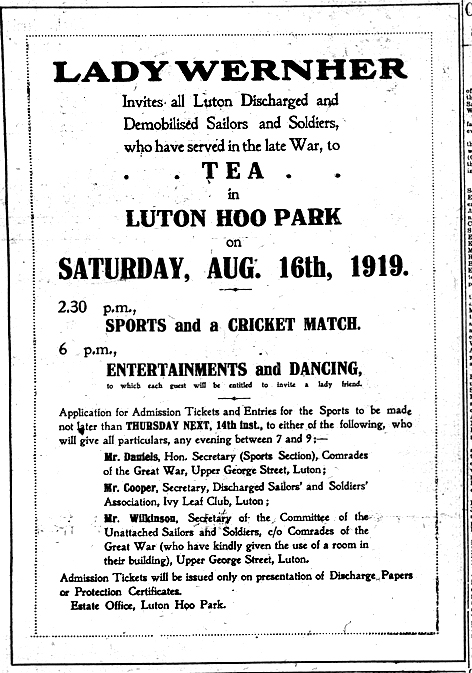
[The Luton News: Thursday, August 7th, 1919]
There is to be nothing on the small scale about the festivities which Lady Wernher is arranging for the ex-servicemen of Luton and of the Luton Hoo Estate. These are to be held on Saturday week, and something of the magnitude of the task which Lady Wernher has set herself can be gathered when we state that four sports grounds will be in use simultaneously, as about 5,000 discharged sailors and soldiers are expected during the afternoon, and probably nearly 10,000 people in all when lady relatives and friends arrive for dancing and other entertainments.
Following the letters of invitation which were sent to the two local Associations of ex-servicemen, and gratefully accepted by both, a joint committee was set up to confer with Mr James Baker, the steward of the Luton Hoo Estate.
The preliminary arrangements for the sports were made, and then came the question of getting into touch with such ex-servicemen as were not members of either organisation. By announcements in the Saturday Telegraph and Tuesday Telegraph these men were invited to attend at the Corn Exchange on Tuesday evening to hear details of such arrangements as were already made, and to selected from their number some representatives to serve on the committee responsible for making the arrangements.
Quite a large number responded to the invitation, and the meeting was of a very happy, informal character. Mr James Baker was in the chair, and representatives of the Federation and Comrades accompanied him.
“The festivities are to be a big success,” said Mr Baker, “and we want the help of the unattached men just as much as that of the organised men in securing this big success.” That was the tone of the meeting throughout, and, although Mr Baker confessed that acting as Chairman at a meeting was not a job much in his line, he managed to get the necessary business done very promptly and agreeably.
First he asked for three men to join the general committee. These were forthcoming in Messrs Stanbridge, Hemsley and Wilkinson, and they were promptly told that they would be expected at a meeting to be held last (Wednesday) evening.
Then, as it is understood there are about 1,600 unattached men, and therefore quite sufficient to produce a good list of competitors for the sports, seven others were asked to volunteer for service as a sports committee. “Active men who can run about a bit on the day,” was Mr Baker's only condition, as they would be required to do duty as stewards on the great day, and the seven were found in Messrs Inns, Hoar, Robertson, Davis, Cooper, Else and Catling.
There are to be four sports grounds prepared as otherwise, according to Mr Baker, “they might go on for a week”. The Federation, the Comrades and the unattached men, and the ex-servicemen in Lady Wernher's employ, would therefore each have their own sports ground.
The events would include 100, 220 and 440 yards flat handicaps, tilting the bucket, a race for bandsmen playing instruments, special events for disabled men, tug-of-war for teams of eight, and a team race for teams of anything from eight to 12. There would be a similar programme on each sports ground, and something 140 or 150 prizes were being given by Lady Wernher.
There was also to be a cricket match between a Luton Hoo XI and an eleven representative of the ex-servicemen of Luton.
About 5,000 were to be catered for in the afternoon and at the tea, so it was quite impossible for Lady Wernher to invite ladies until after tea, when there would be dancing and other entertainments.
For members of the two organisations [DS&S and Comrades], it was explained by Mr Baker, tickets would be sent to those two organisations. Separate rickets would be issued for ladies, and every ex-soldier would receive one of these with his own ticket. “If you are not married, bring your mother: she will like to come,” said Mr Baker.
While there would be no difficulty in seeing that all organised men received their invitations,, it rested to a large extent with the unattached men whether they got theirs or not. Arrangements were being made for the tickets to be available for all who applied for them. Mr Wilkinson was acting as secretary for the unattached men's committee, and the use of the Comrades Club for meetings etc was gladly accepted.
In order that Lady Wernher's generosity would not be abused, it was understood at the meeting that applicants for tickets should be required to produce their protection certificates or other papers proving their bona fides.
Before the meeting dispersed a very cordial resolution of thanks to Lady Wernher was passed, and another to Mr Baker for his active interest.

